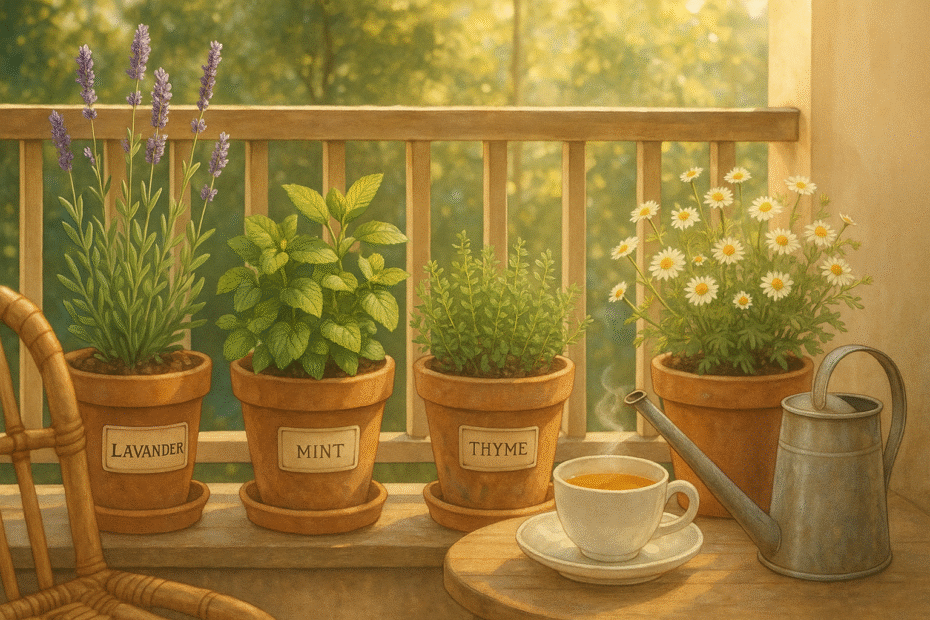Imagine stepping onto your balcony and picking fresh lavender for stress relief, thyme for sore throats, or mint for digestion—all grown in your own tiny herbal oasis. A balcony apothecary garden is a compact, powerful way to grow medicinal herbs that support your well-being right at home.
In this guide, you’ll learn how to start and maintain a self-care herb garden—even with limited space—using beginner-friendly plants that offer big benefits.
Why Grow an Apothecary Garden?
An apothecary garden is a space dedicated to medicinal herbs and healing plants. When grown on a balcony, it offers:
- 🌿 Easy access to natural remedies
- 🌞 A relaxing, therapeutic hobby
- ♻️ A sustainable, zero-waste wellness source
- 💧 Improved air quality and aromatherapy benefits
According to the National Center for Complementary and Integrative Health, many medicinal herbs like lavender and mint have scientifically supported calming and digestive properties.
What You’ll Need to Get Started
Creating a functional balcony apothecary garden doesn’t require a lot of space or equipment. Here’s your starter checklist:
🪴 Supplies:
- Pots or containers with drainage holes (6–12 inches deep)
- Organic potting mix suited for herbs
- Labels or plant markers
- Watering can or spray bottle
- Optional: vertical rack or hanging baskets for space-saving
Top Medicinal Herbs to Grow on a Balcony
1. Lavender (Lavandula spp.)
- Benefits: Calms anxiety, supports sleep, helps with headaches
- Sunlight: Full sun (6+ hours)
- Water: Infrequent—let soil dry between watering
- Use: Make sachets, oils, or sleep sprays
Lavender’s essential oils are clinically shown to reduce anxiety and promote relaxation.
2. Thyme (Thymus vulgaris)
- Benefits: Antibacterial, immune-boosting, good for colds and sore throats
- Sunlight: Full sun
- Water: Allow soil to dry out between watering
- Use: Infuse into teas or steam for respiratory relief
Thyme has thymol, a compound with proven antimicrobial action.
3. Mint (Mentha spp.)
- Benefits: Aids digestion, relieves nausea, freshens breath
- Sunlight: Partial shade to full sun
- Water: Regular—likes moist soil
- Use: Brew into teas or chew fresh for stomach relief
Mint is widely used in herbal medicine to reduce bloating and calm the stomach.
4. Chamomile (Matricaria chamomilla)
- Benefits: Promotes sleep, reduces anxiety, soothes skin
- Sunlight: Full sun
- Water: Moderate—don’t overwater
- Use: Dry flowers for calming tea or skin-soothing compresses
5. Lemon Balm (Melissa officinalis)
- Benefits: Calms nerves, improves mood and focus, aids sleep
- Sunlight: Part sun to full sun
- Water: Keep soil moist but not soggy
- Use: Teas, tinctures, or fresh in salads
Small-Space Growing Tips
- 🪴 Use vertical space: Stack pots on shelves or hang planters on rails
- 🌤 Track sun exposure: Place sun-loving herbs near edges, shade-tolerant ones inside
- 🧼 Keep it tidy: Prune regularly and remove dead leaves to avoid pests
- 🔁 Rotate herbs: If possible, rotate containers for even sun distribution
- 🧪 Harvest often: Picking encourages bushier, healthier growth
Bonus Tip: Group herbs by water needs. For example, mint and lemon balm like moist soil, while lavender and thyme prefer dry roots.
Conclusion: Your Wellness Garden Awaits
A balcony apothecary garden is more than beautiful—it’s a living toolkit for self-care and natural healing. With just a few pots and the right herbs, you can create a healing space that supports your mental clarity, immune system, and overall wellness.
Ready to begin? Start small with 2–3 herbs, watch them grow, and let your balcony become your personal sanctuary of healing.
Frequently Asked Questions (FAQ)
1. Can I grow medicinal herbs without full sun?
Yes! Herbs like mint, lemon balm, and parsley thrive in partial sunlight.
2. How often should I harvest?
You can harvest as soon as the plant is established—just never take more than 1/3 of the plant at once.
3. Do I need fertilizer?
A balanced organic fertilizer every 4–6 weeks can boost growth, especially in containers.
4. Can I use these herbs fresh or should I dry them?
Both! Fresh is great for immediate use. Dry herbs for storage or infusions.
5. Are balcony herbs safe for children and pets?
Most are, but always research individual herbs. Lavender and mint are generally safe; some herbs like rue or wormwood are not.
